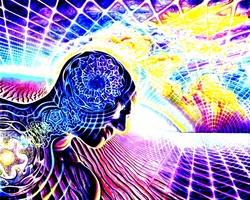
There are tons of examples. Here are a few. Take a look at the pyramids in Egypt. Over time. they went from smooth and shiny to a stack of broken down blocks of stone. Give them a few more thousand years, and you'll have a pile of dirt. When you build a stack of cards, you just know that they won't last. They much prefer falling down. Your car engine works by converting the energy stored in gasoline into heat which results in expanding gases and the movement of pistons. However, not all that stored energy makes it into mechanical energy. The less that 100% conversion is true of every machine ever created, and it's due to each system losing out to friction which results in wear and tear and the eventual demise of the engine.
At first blush life seems to spit in the face of the second law. From the moment of conception we have an organism which gathers material from its surroundings and grows into a increasingly complex and ordered system. This is the opposite of entropy (sometimes called negentropy). The level of organization is incredibly high - organelles, cells, nerves, brain, and organs, all communicating and synchronized. And all this is accomplished automatically without anyone's assistance! Well, there is the DNA molecule. In fact, the DNA (our blueprint) does orchestrate the whole shebang from a tiny group of cells all the way through to our final days... which is of course true for all life on Earth, not just us.
So if we only look at the organism, it does appear to violate the second law...but not really. We are not isolated systems. It's true that we take in food and water, and organize it into living tissue, which decreases entropy. However, if you look closer you'll see that we also excrete a lot of things... like heat, gases, urine and feces. These bits increase the entropy in our environment. Heat stirs up things. Our breath contains a variety of gases that weren't there when we inhaled. Urine and feces contain the remnants of the food we took in, i.e., those nicely-ordered fruits and vegetables have now become something quite a bit less ordered.
When we eventually deteriorate, this is just the second law catching up with us. No machine is perfect, and even the DNA replication process picks up mistakes (mutations) with time, which makes us less efficient. Add to that random changes that occur to proteins due to external forces like radiation (cosmic rays, sunlight). These entropic forces, the tendency toward disorder, will bring down the biological wonder that is life just as surely as the pyramids will become dust one day. You could call it the circle of life, but perhaps more accurately, the CIRCLES OF LIFE, as DNA seems to have been designed to insure it's survival by constantly making copies, each temporary, but resulting in a chain that may go on forever.